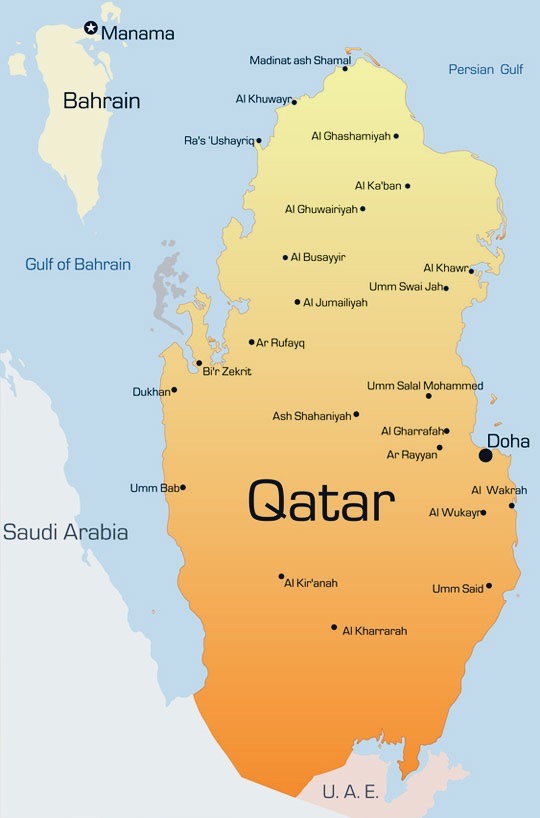Israel’s already complex relationship with Qatar has grown more complicated.
Qatar, one of three Arab states U.S. President Donald Trump is due to visit next week on his second trip abroad since his inauguration in January, has in recent days been denounced by Prime Minister Benjamin Netanyahu.
First, Netanyahu accused Qatar of “playing both sides” in its capacity as one of the mediators between Israel and Hamas in Israeli hostage/Palestinian prisoner talks.
Second, Netanyahu blamed Qatar for the collapse of the latest effort to restart the negotiations. They fell apart in March after Israel refused to abide by its second phase, which required Israel to withdraw from Gaza and call an end to the war, thereby leaving Hamas in control of the coastal enclave.
Qatar, which hosts much of Hamas’ political leadership, subsidizes the pro-Hamas Al Jazeera network and supports a two-state solution, has firmly rejected Netanyahu’s “inflammatory” accusations.
Qatari Prime Minister Sheikh Mohammed bin Abdulrahman al-Thani has said that Qatar has worked tirelessly, along with Egypt and the United States, to broker a truce.
Qatar says that almost all of the released hostages owe their freedom to mediation diplomacy rather than to Israeli military pressure. Qatar says it will continue working with its partners to secure a ceasefire and a hostage deal.
Much to Netanyahu’s consternation, Trump appears to agree with Qatar, the site of the United States’ largest air base in the Middle East.

During his meeting with Netanyahu at the White House on February 4, Trump said, “Qatar its absolutely trying to help. I know them very well, and they’re doing everything they can. Very tough situation, but they’re absolutely trying to help.”
Netanyahu, however, believes that Qatar has not been acting in good faith. As he put it on May 4, “The time has come for Qatar to stop playing both sides with its double talk and decide if it’s on the side of civilization, or if it’s on the side of Hamas barbarism.”
Netanyahu’s reasons for lambasting Qatar at this particular moment seem clear.
Qatar, which punches above its weight in terms of its regional influence, has condemned Israel’s current military campaign in Gaza, which has triggered “one of the worst humanitarian catastrophes of modern times,” a Qatari spokesman charged.
And during a recent International Court of Justice hearing, Qatar accused Israel of genocide, an accusation the Israeli government heatedly denies. In a tweet on the social media site X, Netanyahu wrote, “Israel is fighting a just war with just means.”
Netanyahu’s dim view of Qatar marks something of a shift in his thinking.
Until quite recently, he described Qatar as a “complex” state, but insisted it is not an “enemy state.” He made these comments in defending two aides who are currently under investigation in the “Qatargate” affair for having allegedly accepted payments from Qatar to bolster its image in the Israeli media.
The sour climate in Israel-Qatar relations stands in sharp contrast to the past. In 1996, during the heyday of the Oslo peace process, Qatar opened a trade office in Israel that effectively functioned as an embassy. Qatar closed it in 2009 during the first Israel-Hamas cross-border war.
Nevertheless, at Netanyahu’s request, Qatar donated hundreds of millions of dollars to finance humanitarian projects in Gaza and to pay civil servant salaries. Netanyahu thought that these payments would encourage Hamas to focus on economic development rather than the next round of fighting with Israel.
The opposite happened.
With the assistance of Iran, Israel’s most formidable enemy, Hamas used much of Qatar’s funds to build its military machine, which was unleashed with terrifying effects on October 7, 2023.
Netanyahu has taken a lot of flak for having encouraged Qatar to prop up Hamas financially. And though he has been critical of Qatar lately, he seems unenthusiastic about efforts by several Israeli parliamentarians to pass a bill in the Knesset to designate Qatar as a “terror-supporting state.”
The proposed legislation, which labels Qatar as a “wolf in sheep’s clothing,” was originally initiated last year by Economy Minister Nir Barkat, the former mayor of Jerusalem, but was reportedly blocked by Netanyahu’s office.

The Prime Minister’s Office claims the bill is being “seriously considered,” but it remains to be seen whether it will actually pass.
Bottom line: Netanyahu often disagrees with Qatar on current Middle Eastern issues, but he realizes that it can be a useful diplomatic and financial asset when the need arises.
